

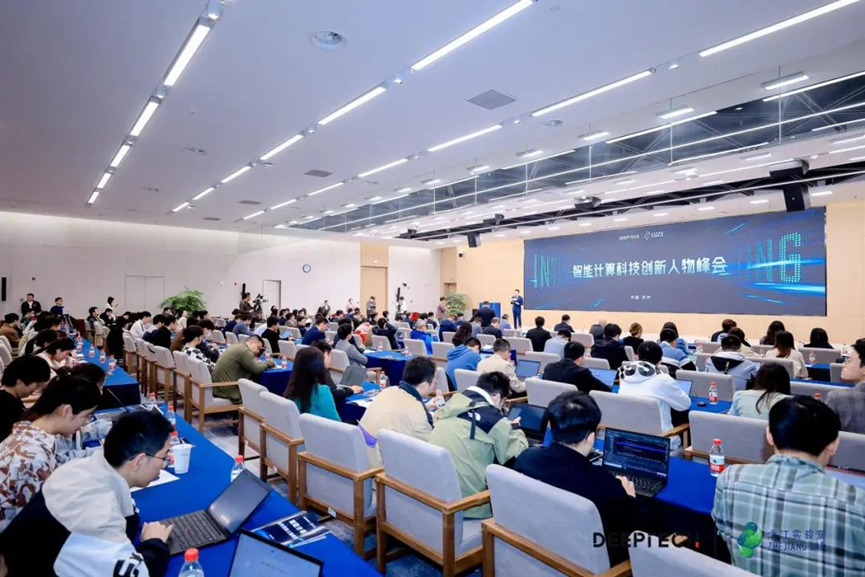
On April 14, 2023, the Intelligent Computing Technology Innovator Summit was successfully held at Zhejiang Lab (ZJ Lab) in Hangzhou. At the conference, the 2022 China's Intelligent Computing Technology Innovators released by DeepTech gathered together to discuss the future of intelligent computing in China.
ZHAO Xinlong, Vice President of ZJ Lab, delivered a speech at the conference, welcoming the guests in attendance. ZHAO said that under the mission of "building a national scientific and technological force", ZJ Lab had made scientific planning, coordination and layout in the field of intelligent computing, and called on more peers to join ZJ Lab to build a system of intelligent science and technology for the ternary fusion of human-cyber-physical and explore the future of intelligent computing together.
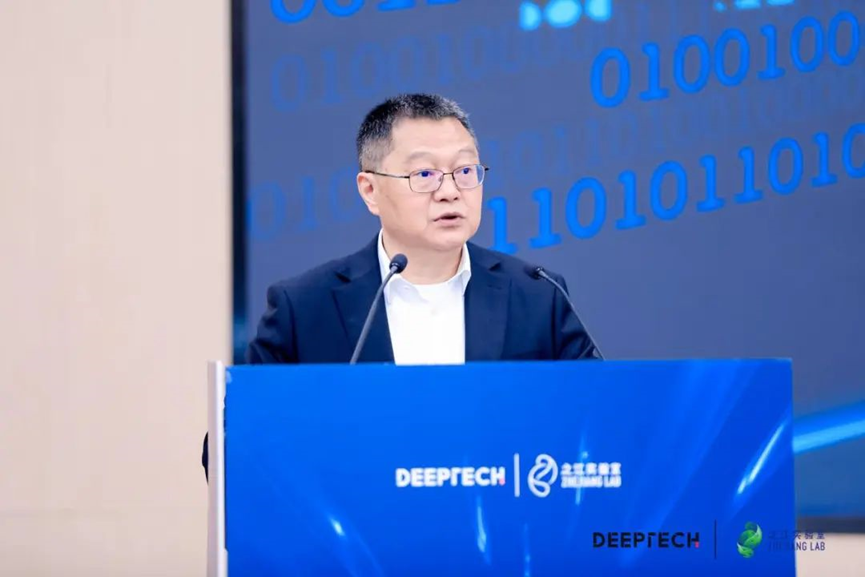
ZHANG Lan, Co-founder and COO of DeepTech, delivered a speech on behalf of the organizer, congratulating the newly selected innovators and introducing the background, purpose and significance of DeepTech's initiation of the award.
It is reported that it is the first time DeepTech has released technology and talent pointers for the intelligent computing industry. With a focus on intelligent computing, intelligence-driven computing, and intelligence, data and computation-driven scientific discovery, the award aims to explore and select the innovators behind the implementation of technology and the generation of practical value, bring more young scholars from behind the scenes to the front stage, showcase the latest academic research results and technological breakthroughs in the field of intelligent computing, and jointly promote the progress of intelligent computing science and technology.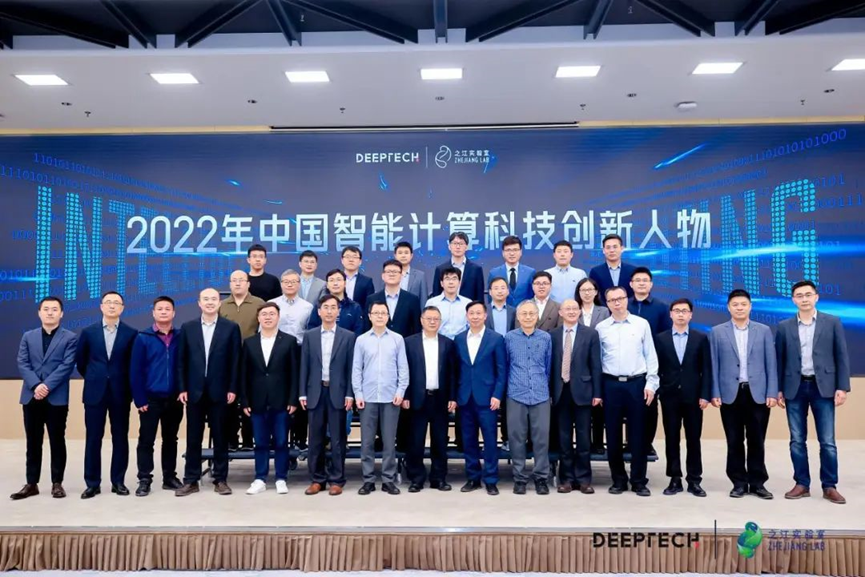
2022 China's Intelligent Computing Technology Innovators with Guests
SUN Yi, Director of the Office of Talent Recruitment of ZJ Lab, shared his thoughts on ZJ Lab's intelligent computing talent community program. SUN Yi first highly praised the selection of the 2022 China's Intelligent Computing Technology Innovators, saying that the award targeted the world's scientific and technological frontiers and major national demands, and covered multi-level computing issues such as devices and chips, advanced computers, software and systems, platforms and applications in the field of computing, and that their spirit of scientific exploration and concern for the well-being of people's lives were also touching. SUN Yi pointed out that talent is the first innovation resource, and ZJ Lab attaches great importance to talent and had made considerable achievements in the development of the talent team. Afterward, he announced ZJ Lab's intelligent computing talent community program, sharing the talent concept of ZJ Lab in macro, meso and micro dimensions, and introduced the rights and benefits of community members in detail, warmly inviting the industry elites to join.
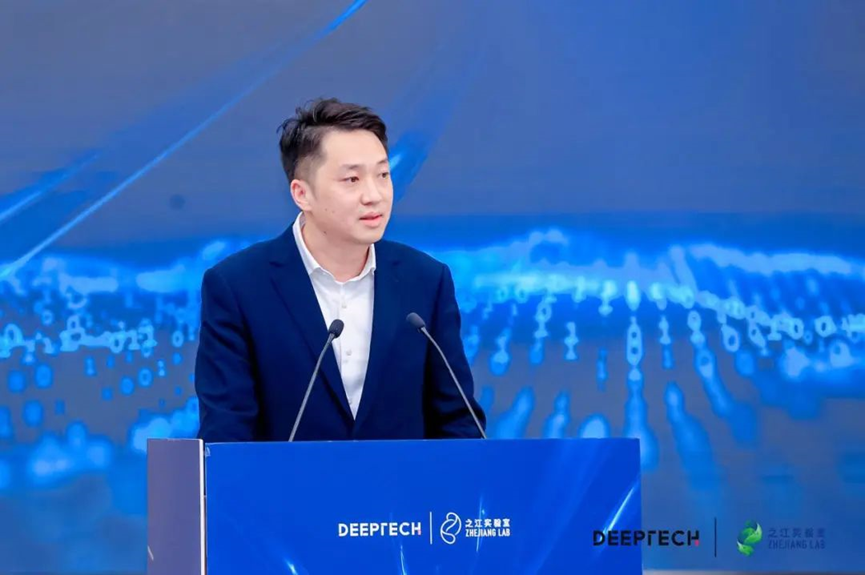
In the session of "Leading - Computing Future", relevant principal investigators shared their latest achievements in the field of intelligent computing. CHEN Guang, Director of the Department of Research Development of ZJ Lab, delivered a speech from the perspective of ZJ's definition of intelligent computing, introducing the layout and achievements of intelligent computing in ZJ Lab, which covers the basic theory of intelligent computing, chips and devices, series of computers, operating systems and software platforms, forming a unique system of intelligent computing. In addition, CHEN Guang focused on sharing the intelligent computing data reactor built by ZJ Lab, a dedicated computing facility that promotes major scientific research with the intelligent computing plus scientific research paradigm, and it has also made important progress in exploring the fields of computational materials, computational genetics, computational pharmaceuticals, computational breeding and computational astronomy.
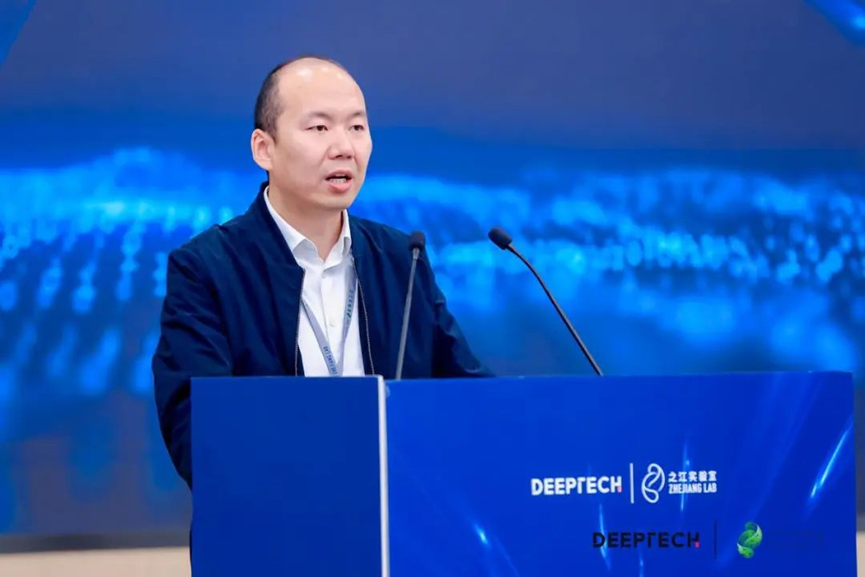
XIE Xing, Senior Principal Research Manager at Microsoft Research Asia, gave a talk on "Responsibility and Challenges of Foundation Models", introducing the challenges of privacy, interpretability, values, security and other aspects of foundation models. He also shared Microsoft's long-term plan for responsible AI and interdisciplinary collaboration. XIE Xing believes that we should accelerate the development of technologies such as AI capability assessment and values alignment to ensure that technology can live in harmony with society and drive responsible AI development.
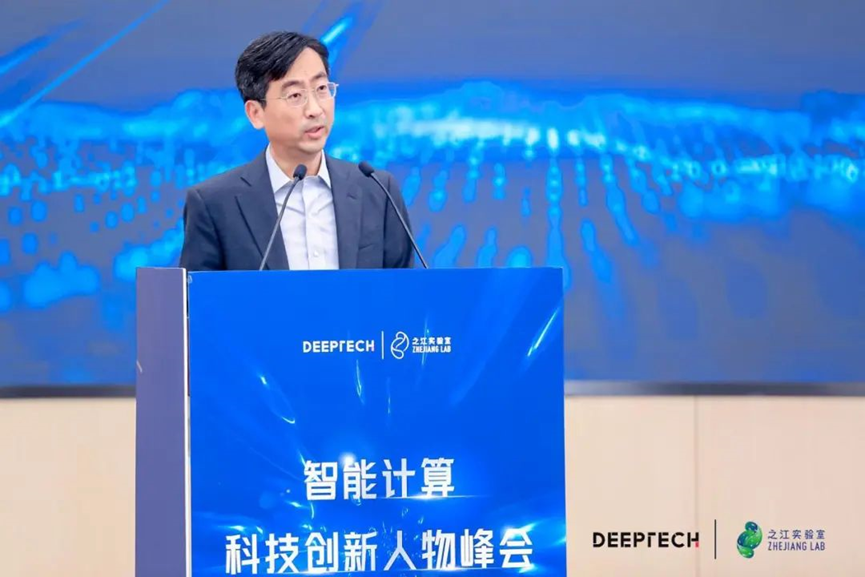
In the session of "Breakthroughs - Youth Power", young scientists shared their views on the themes of "China's breakthroughs" and "youth breakthroughs" and their breakthroughs and recent advances in China's self-developed systems and underlying hardware facilities in the field of intelligent computing. ZHANG Pan, a Research Fellow at the Institute of Theoretical Physics, CAS, gave a talk on "Tensor Network-based Computing", introducing tensor networks and their potential and advantages in handling ultra-high-dimensional linear operations. ZHANG Pan pointed out that many scientific and engineering problems can be solved within the framework of the "linear algebra of the 21st century", citing three examples of applications in statistical physics, generative models, and classical simulations of quantum computers, respectively. He said that tensor networks can provide effective models and use advanced computing devices as a bridge to communicate and solve problems in different fields.
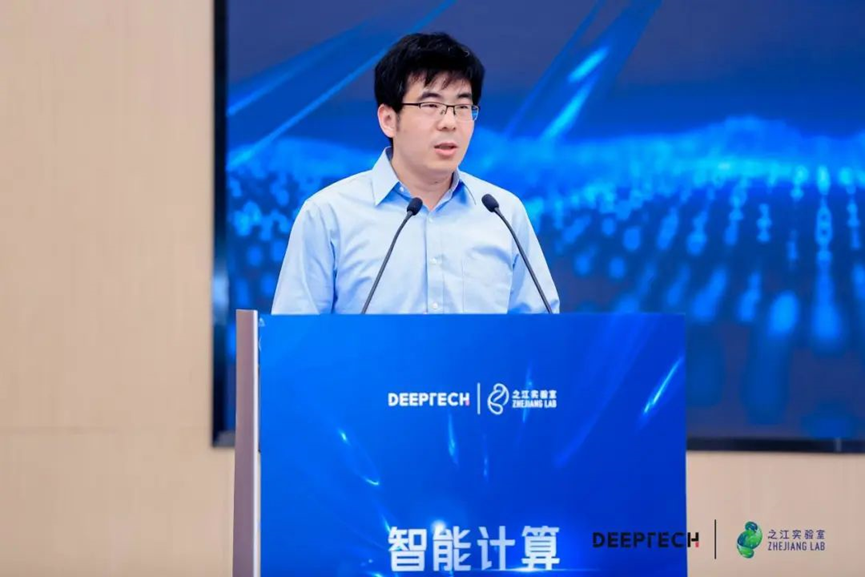
Prof. PEI Hao from East China Normal University introduced his research achievement on biocomputers in his sharing. He gave an in-depth introduction to his research and shared the results of the DNA neural network he built, which is also the largest and most complex artificial biochemical network currently available. Prof. PEI Hao pointed out that biomolecular computing has great potential for applications in molecular diagnosis, intelligent chemical synthesis, intelligent drugs, intelligent materials, and unlimited future development in the fields of molecular intelligence, cellular intelligence and organ-like intelligence.
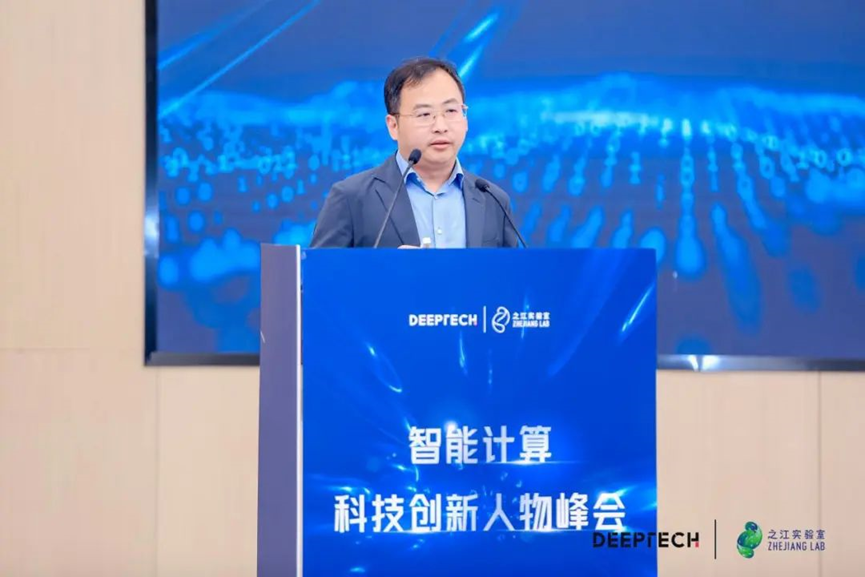
SUN Zhong, a Research Fellow at Peking University, started his speech as the last guest in the morning with the question, "Is digital computing the only one?" He said that for new computing paradigms such as analog computing, quantum computing, and brain-like computing, "the slowdown of Moore's law is the best thing that has happened since Moore's law started." SUN Zhong shared his research on analog computing and pointed out that it also has the advantages of extremely high parallel computing capability, extremely low computational complexity and natural in-store computing with broad application prospects under the premise of computability.
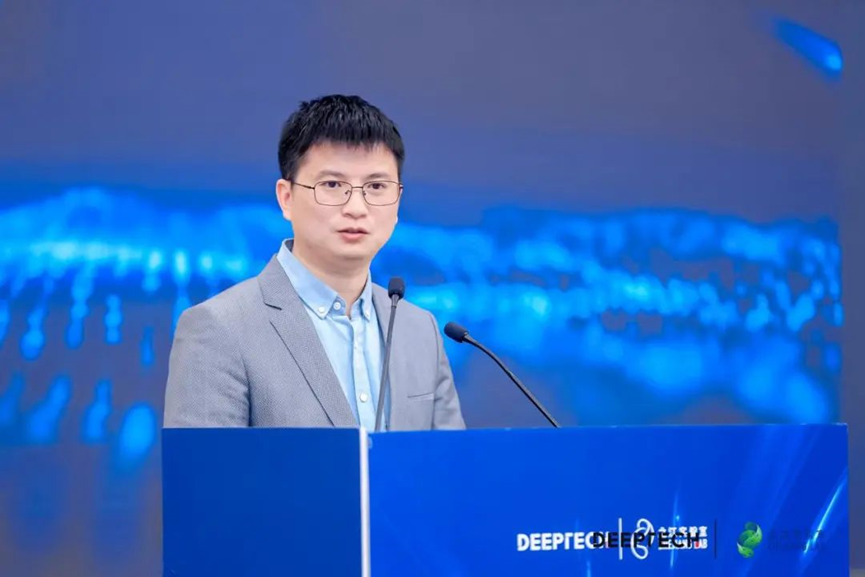
In the afternoon of the day, the summit entered a roundtable discussion session. In the session of "Roundtable - Computational Gaming", five selected innovators discussed the trends and progress of AI for Science under the chairmanship of ZHOU Yaoqi, a Senior Research Fellow at the Institute of Systems and Physical Biology of Shenzhen Bay Laboratory. The five innovators said that AI would help solve the problem of research transparency and reproducibility, and presented their views from different perspectives, such as AI identification of falsification, data sharing on open academic platforms, and even AI reviewers.
During the discussion, YANG Yuedong, a Professor and Deputy Chief Engineer at the National Supercomputer Center in Guangzhou of Sun Yat-sen University, called on domestic pharmaceutical industry practitioners to maintain the patience of long-termism, and said that AIGC can play a huge role in future psychiatric medicine not only by designing drugs but also by personalizing the generation of a large number of images, audio and other stimuli. ZENG Jianyang, an Associate Professor with tenure at the Institute for Interdisciplinary Information Sciences of Tsinghua University, when talking about the impact of GPT on education, noted that AI should free children with heavy learning tasks from repetitive and easily replaceable learning, so that they can think more creatively or develop qualities and abilities. SUN Hao, an Associate Professor with tenure at Renmin University of China, argued that there is still a considerable gap between AI and human critical thinking when it comes to exploring unknown scientific laws, and was looking forward to the emergence of models beyond Transformer. TANG Jian, Founder and CEO of BioGeometry and an Associate Professor at Quebec AI Institute, elaborated on his research in the field of macromolecular design generation, saying that the future would be a trend of combining graph neural networks with foundation models of natural language processing. When it comes to his vision of the future, TANG Jian believes that AI combined with massive astronomical observation data will drive human exploration of the laws of the universe and thus help us achieve space migration. Zhang Cheng, an Associate Research Fellow at the Institute of Software of Peking University, took a novel perspective on the huge potential of AI for emotional communication needs, and pointed out that if AI could enable conversations with deceased family members or give companionship to distant friends and relatives, it would also be a very good economic growth point.
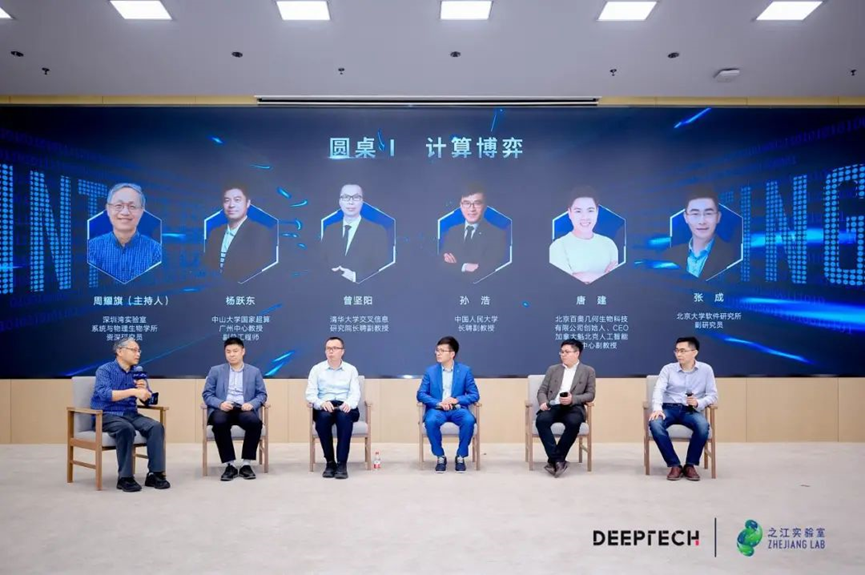 Roundtable - Computational Gaming
Roundtable - Computational Gaming
PAN Pengkai, Senior Engineering Expert at the Research Center for Intelligent Computing Platforms of ZJ Lab, moderated the session of Roundtable - Cyber Future, asking six top leading scientists and industry representatives to discuss innovations in application scenarios and the commercialization of intelligent computing. In discussing what stage AI is currently at in their respective fields, LI Guoqi, a Research Fellow and Doctoral Supervisor at the Institute of Automation, CAS, who specializes in brain-like computing and brain-like intelligence, said that general AI to some extent represents the human ideal, which would keep changing as human understanding of brain structure and function deepens. SUI Yanan, an Associate Professor at Tsinghua University, who specializes in machine learning and neural interaction, argued that current AI has reached an expert level compared to humans, but in terms of its own development history, it is just getting started and is still in its infancy. ZHANG Weifeng, Chief Architect and Vice President (in charge of software) at Lightelligence, who focuses on advanced computing paradigms such as optoelectronic hybrid computing, echoed this view and said that AI can only be called true AI when it poses a threat to humans. SHAN Yi, CEO of PhiGent Robotics, who focuses on self-driving, broke down the question into three important components in the field. SHAN Yi said that sensor AI was at the elementary school level, chip AI at the senior high school level, and solution AI roughly at the junior high school level. It is worth mentioning that PAN Pengkai had a different view, believing that AI was already at the top Ph.D. level.
PAN Pengkai invited the guests to think about AI in ten years. QIAO Ning, Founder and CEO of SynSense, said that what he would most like to see is to turn GPT and other foundation models into pulses for end-side deployment through brain-like technology to achieve ubiquitous intelligence for everything, while his greatest concern is that the human brain does not have enough dimensions to thoroughly understand its own dynamics. ZHAO Liang, a Research Fellow of the Hundred Talents Program at Zhejiang University, has a similar idea, hoping to store foundation models on chips to realize end-side AI computing, though he also said that the last thing he wants to see is humans relying too much on these AI models, which would lead to some negative effects such as wasted resources and burgeoning energy consumption. In addition, the guests also discussed academia-industry collaboration in depth, proposing many new ideas and implementation paths.
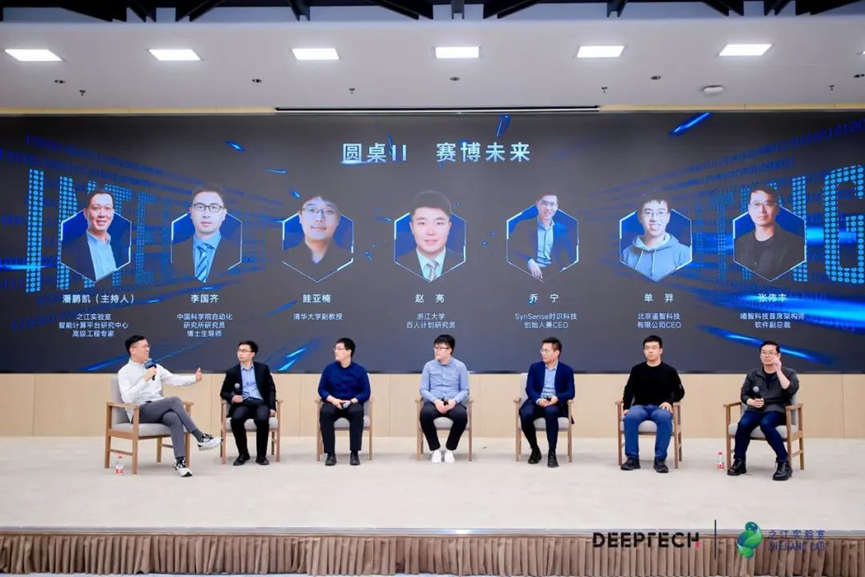 Roundtable - Cyber Future
Roundtable - Cyber Future
The summit came to a successful conclusion. At a time when computational power is becoming technology discourse power that countries, industries and enterprises are competing for at a super-accelerated pace, China's intelligent computing industry is showing great signs of vitality, and we are working with young stalwarts who are pioneering a new future in intelligent computing technology to embrace the "China Opportunity" in technology and industry.











